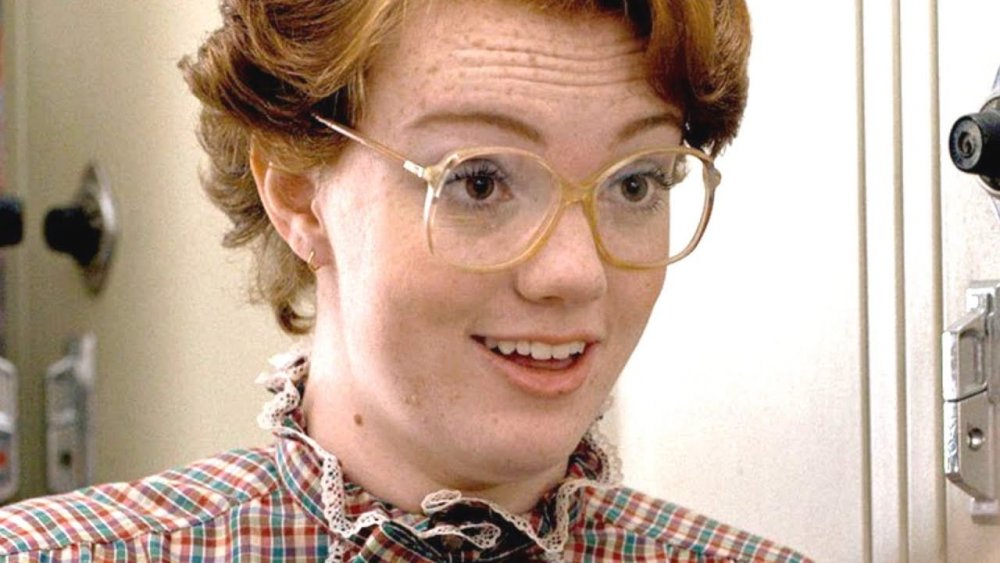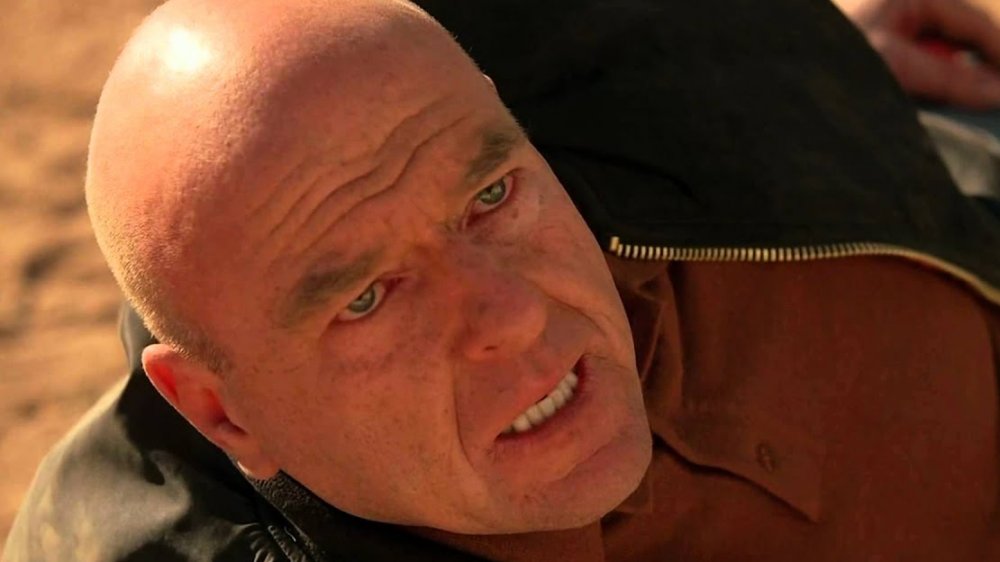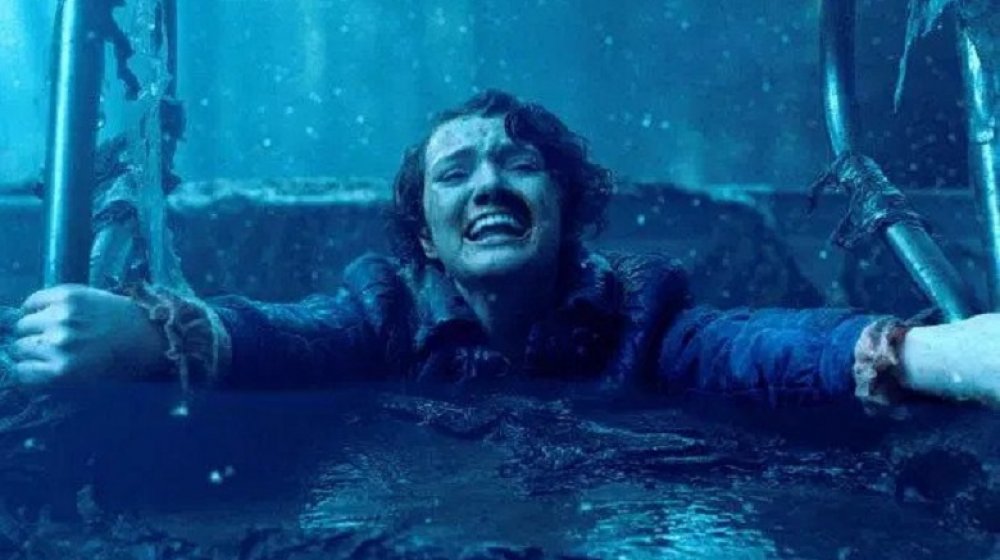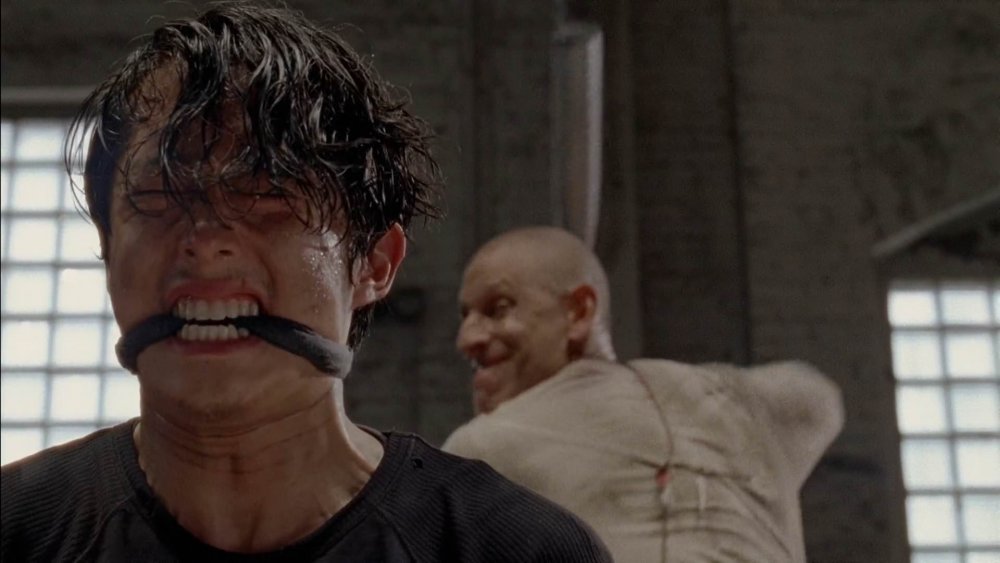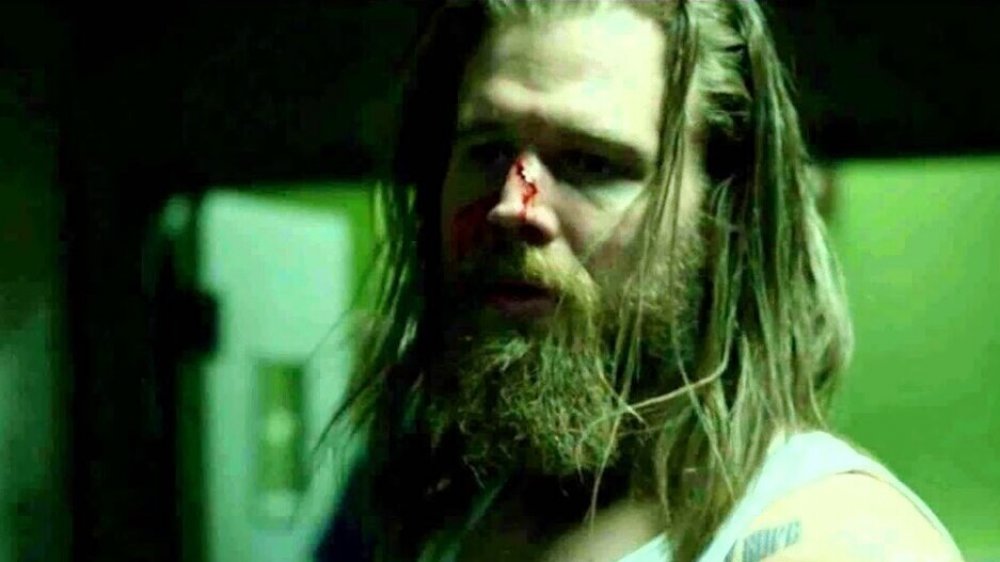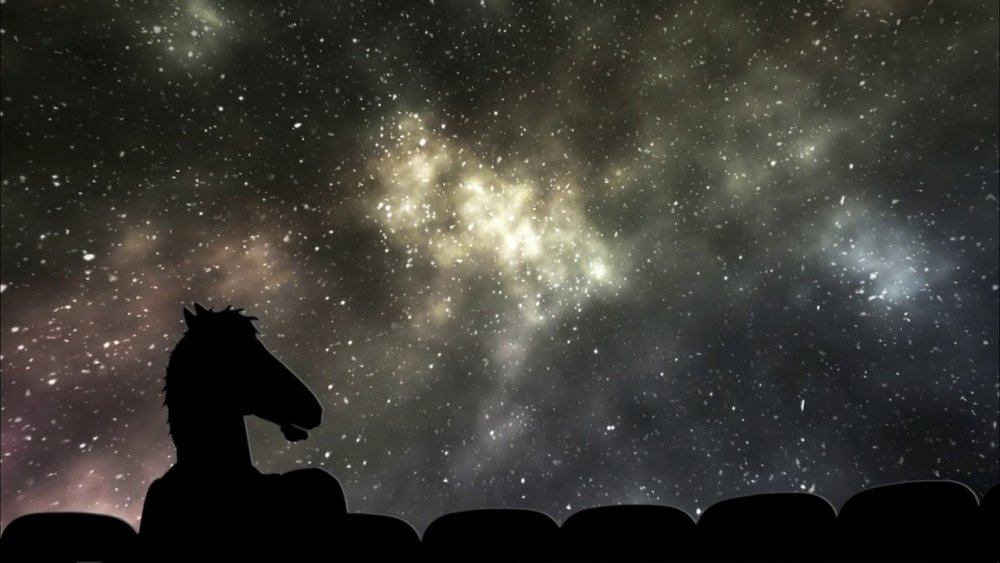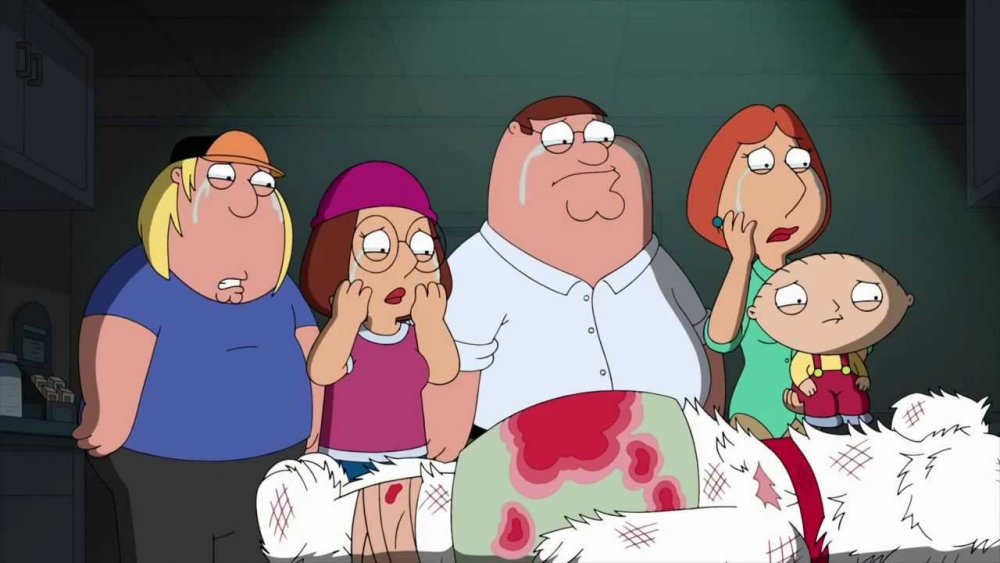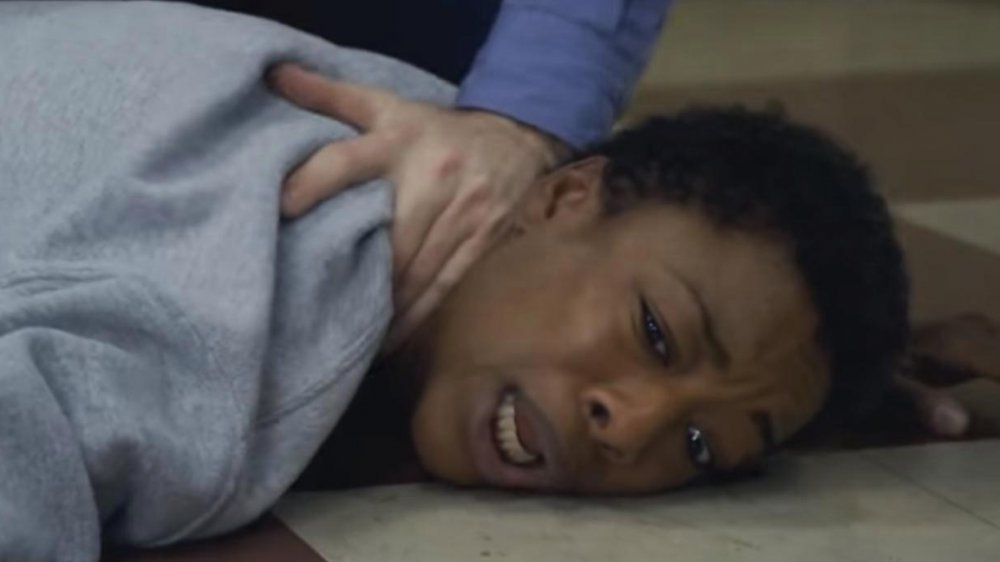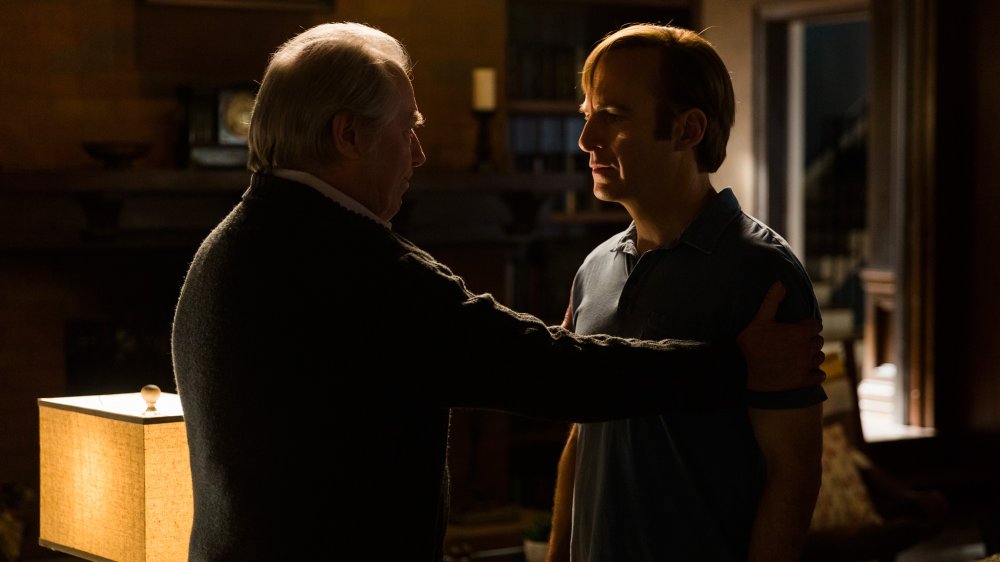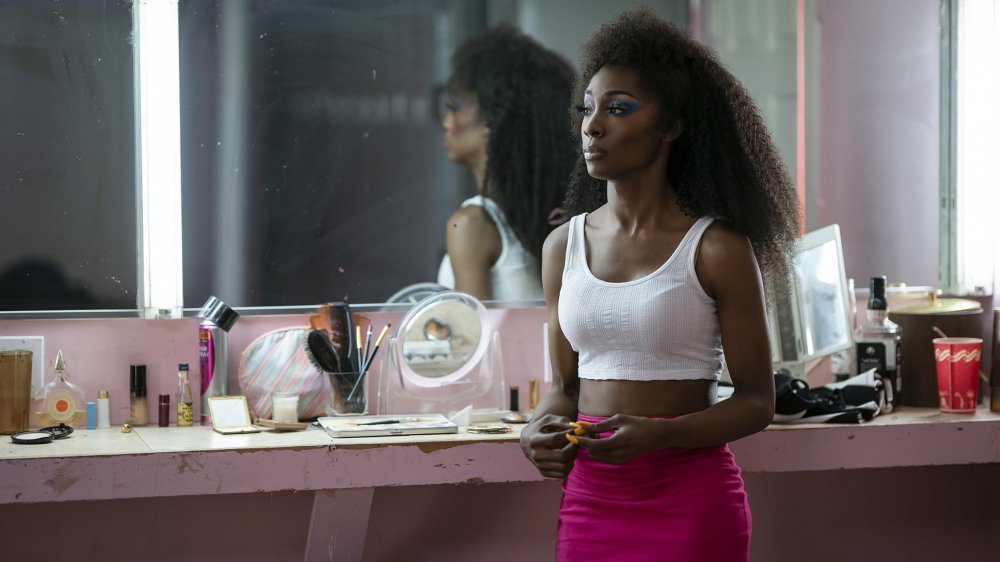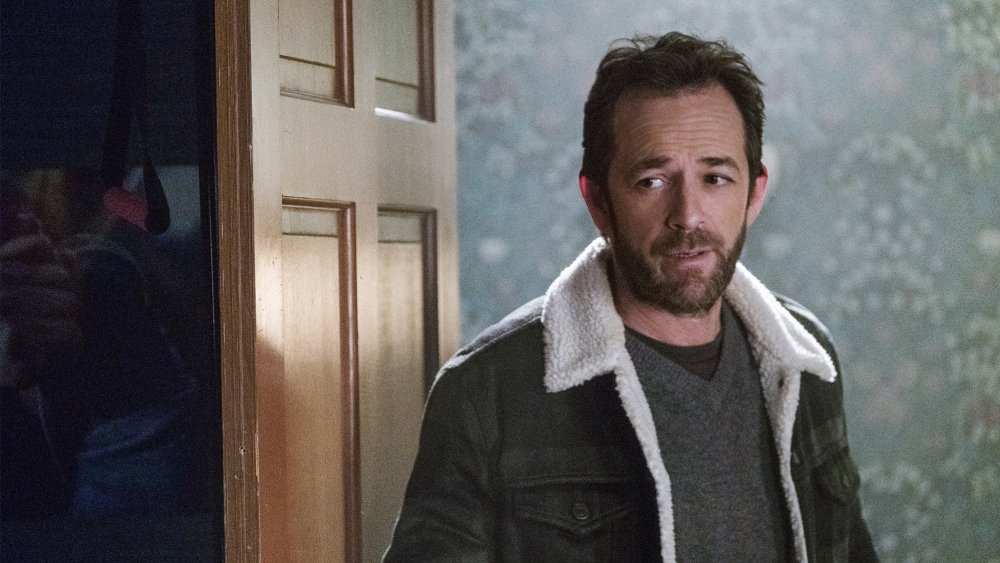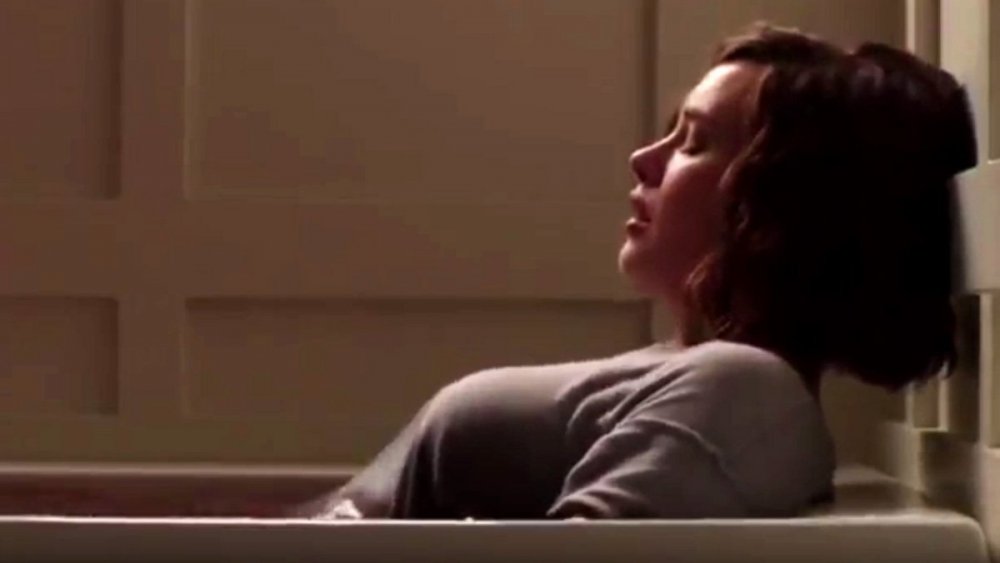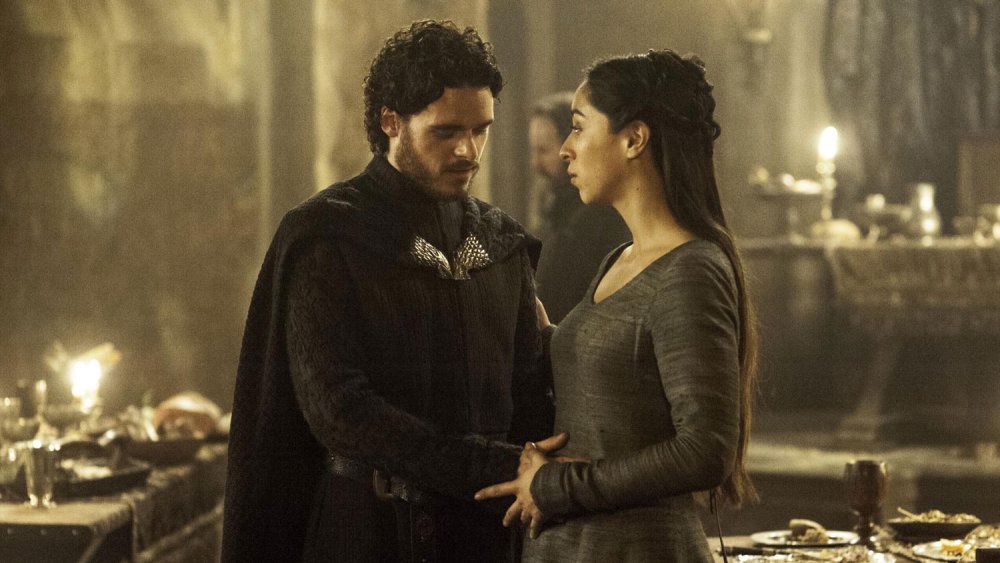TV Deaths From The Past Decade We're Still Mourning
Humanity's been in the age of Peak TV for what seems like about a hundred years now, and boy, is it ever great. Just name it, and you can probably find a high-budget, prestige series about it. A mob boss who has to see a shrink to deal with his feelings about whackin' guys? Check. A high school chemistry teacher who has to cook meth to provide for his family after he dies of cancer, except he never dies of cancer? Check. The Western-tinged, oddly heartfelt adventures of not-Boba Fett and not-really-baby-Yoda? Check. Four kids dealing with Demogorgons and upside-down alternate dimensions while fighting evil government entities and disbelieving authority figures? Check. A space warrior who team up with his shrink to cook meth so he can provide for his baby Demogorgon? Not yet, but it's definitely coming.
With all of this greatness, though, comes a downside. See, dramas can't be dramas with dramatic developments, and there are few more dramatic than beloved characters kicking the bucket right before our eyes. The awesome TV series that kept us riveted throughout the teens often employed the device of making us wonder just which bucket would be kicked, and who would do the kicking — and often, that bucket would end up filled with our bitter tears. Let's leave that incredibly strained metaphor behind, and check out the TV deaths from the last decade that we're still not over.
Hank Schrader, Breaking Bad
Of all the characters on Breaking Bad, Hank Schrader (Dean Norris) — DEA agent and brother-in-law to Walter White (Bryan Cranston), the meth king of New Mexico — could be the most frustrating. He was a genuinely good guy, but he could be bullheaded, stubborn, and prone to lashing out at those around him, but with good reason; he always seemed to be right on the cusp of discovering Walter's secret, and the constant whispering of his gut telling him so had to just drive him nuts. His death came in what many consider to be the finest episode of the series overall, and its third-to-last: "Ozymandias," in which every damn thing starts to come crashing down around Walter, and everyone close to him pays the price.
Tricked by former partner Jesse (Aaron Paul) into driving out to the remote spot in the desert where his money is buried, Walter panics when the kid shows up with Hank and his partner Gomez. Walt makes the fatal error of calling new associate Jack and his neo-Nazi gang to assist, and, well, they do, by way of a hail of bullets; with Gomez dead and Jesse captured, Jack forces Walter to plead for Hank's life, even as Hank knows that he "made up his mind 10 minutes ago." One gunshot and one brilliant reaction shot from Cranston was all it took to break our hearts, and the remainder of the series didn't play any nicer.
Barb, Stranger Things
The first season of Netflix's Stranger Things was a revelation, but as it was heavily inspired by the works of Stephen King and every single cool movie we saw in the '80s, we were pretty sure it wasn't capable of throwing us many curveballs. We knew that Joyce (Winona Ryder) was right about the disappearance of her son Will (Noah Schnapp), and that he was still alive in the "Upside Down" alternate dimension seeping into their town; we knew that the gruff local sheriff (David Harbour) would eventually figure this out and assist in his rescue, and we knew that Will's buddies, especially Mike (Finn Wolfhard) and the mysterious and powerful Eleven (Millie Bobby Brown) would defeat the monstrous Demogorgon. But we were pretty sure that Barb (Shannon Purser), the best friend of Mike's sister Nancy (Natalia Dyer), was getting set up to be a major supporting character, because she was just so damn delightful.
How wrong we were. Barb getting sucked into the Upside Down, in just the second episode, was a major shock — and we all held out hope for her return, right up until the time her dead body (being used as an incubator for some gross slug-things) was found by Eleven in episode 7. Way to string us along, Stranger Things! At least they found Will, but that just created a whole new set of problems.
Glenn Rhee, Walking Dead
Even if you'd never read the comics, you knew something bad was going to go down the moment Rick Grimes (Andrew Lincoln) ordered the preemptive strike on the supposedly tiny Savior gang near the end of the sixth season of The Walking Dead. If you had read the comics, you knew exactly what was likely to happen, and you may have stopped watching the show around this time just to save yourself the trauma. Turned out there were a heck of a lot more Saviors than ol' Rick thought, and that their leader was a psychopath named Negan with a barbed wire-enhanced baseball bat, who responded to Rick's encroachment with some head bashin' fury.
With Rick and company held captive, the noble Abraham (Michael Cudlitz) was the first to get bashed, and we all for a brief moment entertained the notion that the beloved Glenn (Steven Yeun) would escape his cruel fate from the comics. He... did not, and his execution was, if anything, even more gruesome and heart-rending than it was in print. Adding insult to head bashing, the series made us wait for months between seasons 6 and 7 for this brutal resolution.
Opie, Sons of Anarchy
Regular viewers of Sons of Anarchy were used to violent and shocking deaths, but perhaps none was quite so emotional as that of Harry "Opie" Winston (Ryan Hurst), the best friend of Jax Teller (Charlie Hunnam) since childhood. After the shooting of Clay (Ron Perlman) near the end of season 4, events spiral out of control, leaving the daughter of feared gangster Damon Pope (Harold Perrineau) dead by the hand of Tig (Kim Coates). He, Jax, Opie, and Chibs (Tommy Flanagan) end up in jail with Pope, who demands a meaty cut of SAMCRO's profits for the death of his daughter — plus, well, a blood sacrifice.
An incident is staged in which one of the four will have to deck a guard and get willingly beaten to death, and Jax appears willing to be the one — but at the last minute, Opie steps up to give new meaning to the phrase, "Take one for the team." The guards literally work him over until he's dead, right in front of Jax, who is powerless in more ways than one to do anything about it. Ah, the romantic life of a motorcycle gang member.
Sarah Lynn, Bojack Horseman
As hilarious as it is, BoJack Horseman has always been totally, enthusiastically willing to just wind up and sock viewers right in the gut. Perhaps the series' most brutal moment came near the end of season 3, in an episode titled, "That's Too Much, Man!" — BoJack's old co-star Sarah Lynn's catchphrase on their '90s TV show Horsin' Around, and an apt description of the episode itself.
As Sarah Lynn prepares to celebrate nine months of sobriety, BoJack gives her a call to ask if she wants to party. Of course, she agrees, and humorous hijinks ensue as BoJack attempts (and utterly fails) to make amends to everyone he's harmed while the pair are literally in the throes of what must be a months-long bender (it's tough to gauge, because they keep blacking out). After going through a truckload of pills, booze, and heroin, the duo finally end up at a planetarium, and while they take in the show, BoJack appears to reach some kind of Zen mindstate. He tells Sarah Lynn: "We're not doomed. In the grand scheme of things, we're just tiny specks that will one day be forgotten. So it doesn't matter what we did in the past, or how we'll be remembered. The only thing that matters is right now. This moment. This one spectacular moment we are sharing together. Right, Sarah Lynn? Sarah Lynn?" She doesn't answer, because she has OD'ed, and her death will weigh on BoJack for the rest of his life. Zany!
Brian Griffin, Family Guy
Speaking of animated series that made you cry in the 2010s, reliable gag machine Family Guy didn't so much punch viewers in the gut in the season 12 episode "Life of Brian" as it did kick them in the groinal area. In a shocking moment that is in no way telegraphed, that boozy old louse Brian Griffin, the family dog, is hit by a car and left a mangled mess. Hey, we've seen characters on this show go through worse; heck, Stewie has literally shot Brian full of holes, and everything turned out fine. But not this time: Brian dies on the operating table, leaving the Griffin family devastated.
The show absolutely committed to this development, with the family even getting a new dog, Vinny (Tony Sirico), who replaces Brian in the next episode — even during the opening credits sequence. But in the episode following that, "Christmas Guy," Stewie uses his time machine to prevent the accident that killed Brian, setting everything back the way it was. Sure, Brian's death was only temporary — but Family Guy is no BoJack Horseman, and viewers were in no way prepared for that wrenching death scene, and the following week's tease that Brian's exit might be permanent. Stupid Family Guy, we're still not sure we forgive you.
Poussey Washington, OITNB
Aside from the increasingly crazy storylines, the thing that always kept viewers coming back to Orange is the New Black was the well-developed, compelling characters. After the first season or two, it didn't even really seem as if Piper (Taylor Schilling) was the star of the show anymore — not when Litchfield residents like Suzanne "Crazy Eyes" Warren (Uzo Aduba), Nicky Nichols (Natasha Lyonne), Tasha "Taystee" Jefferson (Danielle Brooks), and Poussey Washington (Samira WIley) were so much more interesting.
Poussey in particular was perhaps more full of life and optimism than any other character, and in the second-to-last episode of OITNB's fourth season, "The Animals," our affinity for her was mercilessly exploited. As the inmates stage a cafeteria protest over their unfair treatment at the hands of Captain Piscatella, Crazy Eyes begins to freak out; when it becomes apparent that she's about to be hauled off to Psych, Poussey attempts to intervene. For her trouble, she's restrained face down on the floor — quite improperly, as it turns out, and as chaos rages in the cafeteria, she silently suffocates to death. Taystee's reaction alone was enough to make us feel that perhaps we should hang this series up for good, but did we? No, of course we didn't.
Chuck McGill, Better Call Saul
You never really knew how to feel about Chuck McGill (Michael McKean), the older brother of Jimmy McGill/Saul Goodman (Bob Odenkirk) on Better Call Saul. Sure, he was a brilliant attorney and you got the sense that he could be a valuable ally — and yet, for as much as he kept up the appearance of caring about his brother, you also got the sense that he wanted nothing more than to see him fall back into his "Slippin' Jimmy" criminal ways. There was also his electromagnetic hypersensitivity, which forced him out of active duty at the law firm he co-founded and made him sympathetic — even if it may have been all in his head.
This indeed appears to be the case when, at Jimmy's bar association hearing, he destroys Chuck's credibility by pulling a trick with a cell phone battery which implies that Chuck is either a) faking his condition or b) mentally ill. In the aftermath, Chuck struggles to overcome his condition and regain his position within his firm, and just face plants at both. Cut off from everyone and his symptoms worsening, the ever-determined lawyer sets his own house on fire while still inside it in Better Call Saul's season 3 finale — a shocking end that we never saw coming for the old butthead whom McKean portrayed so memorably.
Candy Ferocity, Pose
Candy Ferocity (played to perfection by trans actress Angelica Ross) was one of the liveliest and most interesting characters on Pose, FX's critically lauded examination of the non-gender-conforming New York City ballroom scene of the '80s. As one might imagine, the series gives even its toughest and most resilient characters plenty of hardships to face; in the case of Candy, we watched her overcome a ridiculous number of those, only for her life to be snuffed out in the cruelest and most random manner possible.
The former Candy Abundance rechristened herself after establishing her own House — a collective of ballroom performers who see each other as family — with her "sibling" Lulu after the collapse of House Abundance. She's forced to turn to prostitution to help pay the bills, and it's this choice that leads to her shocking death: early in the series' second season, she's murdered by a john and stuffed into a closet, where her family finds her two days later. It was an absolutely brutal narrative choice that Ross and the show's creator Ryan Murphy were forced to publicly defend — pointing out, rightly, that it was only a sad reflection of the reality of life as a trans woman.
Fred Andrews, Riverdale
Some tough choices are made by the creative minds behind out favorite series, and others are made for them by real life. Such was the case with Riverdale's Fred Andrews, the father of main character Archie and a plum late-career role for Luke Perry, who became a fan favorite on the series many years past his Beverly Hills, 90210 superstardom.
Perry suffered a massive stroke midway through the production of Riverdale's third season, and he hung on for a week before passing away. His stunned and saddened castmates carried on, and the show's writers crafted a lovely farewell: a fourth season premiere in which Fred was given a valiant death. He's struck down by a hit-and-run driver after pushing a woman (his fellow 90210 alum Shannen Doherty) out of the way of the speeding vehicle, and near the episode's conclusion, he's given a tear-jerking eulogy by his son that is quite tonally different from the show's usual pulpy melodrama. It was a fitting sendoff for the beloved actor, and not only did the episode carry a dedication to him at its end, but all future ones will also — giving fans a weekly excuse to get in a good cry.
Hannah Baker, 13 Reasons Why
The first season of Netflix's 13 Reasons Why was a measured, intense trek toward a tragedy that we all knew was coming; it was baked into the show's premise, which saw ostracized teenager Hannah Baker (Katherine Langford) leave behind a series of audio cassettes for her friends and acquaintances detailing each one's part in her decision to commit suicide. For twelve episodes, we wondered how the series would handle the actual event — and when the final episode of the season answered the question, we immediately wished it hadn't.
Hannah's suicide — in which she slits her wrist in the bathtub — was presented unflinchingly, harrowingly, and without looking away. So realistic, sad and terrifying was the scene (Langford is a heck of an actress, and she gave it her all) that the series immediately came under scrutiny for potentially posing a threat to the mental health of troubled viewers. The series has carried on for two more seasons and will soon get a fourth and final outing, all dealing with the aftermath of Hannah's death — but that one three-minute scene has continued to provoke controversy, to the point that Netflix heavily edited it in advance of the season three premiere. The actual act of suicide is no longer depicted; now, if only fans could remove the scene from their brains as easily as Netflix removed it from its servers.
If you or anyone you know is having suicidal thoughts, please call the National Suicide Prevention Lifeline at 1-800-273-TALK (8255).
Talisa Stark, Game of Thrones
It's no easy feat to pick the death that rattled fans the most throughout Game of Thrones' eight-season run; it was, after all, a series in which some beloved fan favorite character somehow seemed to die in every episode. We're pretty sure we can pin it down, though, and it may not surprise you to know that our pick for the Thrones-iest death of all came during the infamous season 3 episode "The Rains of Castamere," which depicted the event known as the Red Wedding.
As a result of a conspiracy between Walder Frey and Tywin Lannister, King Robb Stark, his wife Talisa, and... well, pretty much all of the rest of the Starks (and their army numbering some 15,000 soldiers) are ambushed and massacred at the wedding of Edmure Tully, Robb's uncle, and Roslin Frey. The ostensible reason is the breaking of a marriage pact between the Houses Stark and Frey, the real reason is (of course) far more politically devious — but that doesn't really matter. What matters is that the pregnant Queen Talisa had just told King Robb what she wanted to name their baby, moments before both she and said unborn child are dispatched in a manner that we can't exactly bring ourselves to make explicit. If you're a Thrones fan, you already know; if not, allow us to inform you that everything you've heard about this series is true, and you've probably stayed away for good reason.
